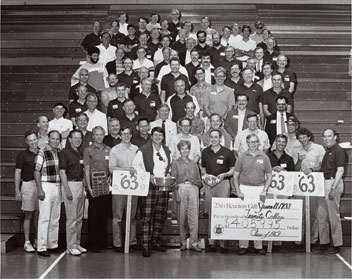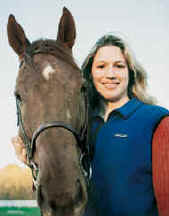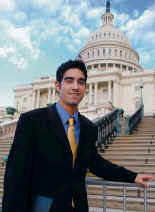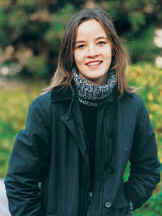The "uncles" pitch in
 What we
wanted from the outset was not just any old scholarship,” says Jack Wagget
’63, reflecting on the 1988 birth of the Class of 1963 Scholarship Fund.
“We wanted to add something to a scholarship that would be distinctive, that
would provide the admissions folks with a competitive edge in the recruitment
business, and that would provide recipients with something more than just a
credit against their tuition bills.”
What we
wanted from the outset was not just any old scholarship,” says Jack Wagget
’63, reflecting on the 1988 birth of the Class of 1963 Scholarship Fund.
“We wanted to add something to a scholarship that would be distinctive, that
would provide the admissions folks with a competitive edge in the recruitment
business, and that would provide recipients with something more than just a
credit against their tuition bills.”
The occasion was the class’s 25th reunion (pictured above), and the College was in the final year of a capital campaign. The class was determined to make a significant reunion gift to help cap off the campaign, and the success of their fundraising effort ultimately enabled them to establish an extraordinarily generous and creative scholarship program. According to Scott Reynolds ’63, “We raised nearly $420,000, which was a reunion record that stood for many years.”
But they were seeking something greater than a reunion record. Many members of the class had been able to attend Trinity because of scholarship support, and a scholarship named for the class seemed to be the most appropriate way to both repay the College and to ensure that future generations had the same opportunities.
In order “not just to have any old scholarship,” the class devised a program of support for their scholars that included not only substantial relief from financial obligations, but also the support of mentors who would be ready to assist the scholars both as students and as graduates. The main features of the program are as follows:
1. Complete replacement of the loan component in each student’s financial aid package. The aim is to relieve the student and his or her family from having to make loan payments in the future.
2. A summer stipend to support travel, internships, or some other meaningful experience during the summer between the junior and senior years. “A lot of typical summer jobs are not exactly mind-stretching,” says Reynolds. “We want our scholars to be free to have a summer experience that will be interesting and that will be useful to them later on.”
3. Mentoring during the students’ years at Trinity, as well as help in establishing careers following graduation. “We offer what I call avuncular support,” says Jim Tozer ’63. “We can be ‘uncles’ to these students and help them make the transition from what are often non-college families into being fully homogenized with America’s leaders.”
The mentoring component is perhaps the most unique feature of the program, as it encourages the scholarship recipients to turn to members of the class for encouragement and advice during their time at Trinity, as well as assistance in establishing careers later on. “This is not just about dollars,” says Wagget, who along with Dick Gooden ’63 is the current co-chair of the scholarship committee. “It’s about a continuing commitment to our students and in some cases, to their families. We want members of our class—some local, some who might live at a distance—to be available during the students’ time in college and later on, if they have questions, if they need help in school, and if they need job help.”
The mentoring program is further strengthened by the annual Class of ’63 scholarship dinner, which takes place at Homecoming, and which includes members of the class, their families, current scholarship holders, and alumni of the program. “Our dinners help the new students bond with the older scholars,” says Tozer. “They’re part of what makes the program unique.”
Not only is the scholarship designed to benefit individual students, but it is also intended to benefit Trinity in several ways. First, the Class of ’63 aims to attract students who have potential to be leaders in the Trinity community. “We are looking for kids who can make a difference here,” says Wagget, “and by extension, make a difference in society later in life. We want people who have a terrific personal presence and who have leadership potential.”
Also, the scholarship often gives Trinity an advantage when several colleges are competing for a particularly good student. For example, both Bao Pham ’06 and Jamie Calabrese ’05, Class of ’63 scholars who are profiled below, were potentially headed for other upper-tier liberal arts colleges before their scholarships persuaded them to attend Trinity.
The program has already turned out a number of graduates who have gone on to successful and productive lives. Tony Canata ’93, the program’s first graduate, is now an attorney in western Massachusetts. He credits the mentoring aspect of the program with making his time in law school more manageable. “I don’t have any lawyers in my family, so it was pretty neat to be able to talk to Victor Keen, who is a lawyer and a member of the Class of ’63, about where I was going and what law school was going to be like. We have become very close over the years.”
Jennie Noakes ’01, now a Ph.D. candidate in musicology at the University of Pennsylvania, says “The scholarship certainly had an enormous impact on my postgraduate life. Not having any loans made everything possible for me. After I graduated, I wasn’t limited by having to make money to pay back loans. I could go anywhere and do anything that interested me. Having that freedom allowed me to pursue some avenues I probably wouldn’t have otherwise. It has changed my life.”
There is one Class of ’63 scholarship recipient in each Trinity class. The current students are profiled below.
| Bao Pham Class of 2006 Hometown: West Hartford, Connecticut Major: Not declared, possibly pre-med |
 |
“It’s nice to have somebody to talk to,” says first-year student Bao Pham about her growing relationship with her mentors in the Class of 1963. “What this scholarship means is that I have a connection with people who have accomplished many of their goals. I have already had a chance to talk to a lot of members of the class, just to hear about their experiences. They have a lot of things to teach me, and I am hoping to get a lot of knowledge from them.”
Even though she’s only in her first year of college, Pham is already deep into an ambitious program of study that she hopes will eventually lead to medical school. “I’m taking calculus and biology and physics,” she says. “But I also want to take humanities courses and get involved in the Human Rights Program as well. There are courses at Trinity that offer a connection between medicine and human rights, and I hope that I can minor in human rights.”
These plans are enough to keep most people fully occupied, but Pham still has room for another interest . . . art. “Visual art has always been a passion, so I am planning to take a course in that every semester, painting mostly, but drawing is fun too. The painting studio on Vernon Street is where I spend a lot of time.”
Pham notes that the Class of ’63 Scholarship is what finally made her decide to attend Trinity. “All the schools I was considering were pretty much at the same level as far as academics and the availability of programs. It was difficult to make the decision, but the scholarship tipped me.”
|
Jamie Calabrese |
 |
“We want you to do what you do best—get involved in the school, pick your projects, and work hard.” Jamie Calabrese got this message loud and clear when she visited the Trinity campus while she was still in high school. “It was the attitude of the people I met—deans, faculty members, coaches—who all said ‘we really want you to do what we know you’re capable of.’ The great thing about Trinity is that when you find something that’s important to you, you know you can make a difference.”
Calabrese has already made a difference by revitalizing the College’s equestrian team. “When I became president of the team, I decided to advertise for new members, and as a result our membership has tripled, and we have just received a huge increase in funding. A lot of people don’t know that we have an equestrian team because our activities take place off campus, but Trinity respects its students and the College is helping because it cares.”
Her other major project is helping other students connect with the city of Hartford. “My dad worked in Hartford for years, and so our family has always been in and out of the city. I remember watching the Nutcracker at the Bushnell when I was six. And so it was a rude awakening for me to come to Trinity and realize that many of the students aren’t from the area and that they haven’t been exposed to the city in a positive way.” Calabrese is working with campus officials to help expand transportation options for students who wish to take advantage of downtown Hartford’s cultural and recreational opportunities.
At this stage in her Trinity career, Calabrese says that the possibilities seem inexhaustible. There are tentative plans for an equestrian project with the Trinity Boys & Girls Club of Hartford; possibly a junior year abroad at Trinity’s Global Learning Site in Santiago, Chile; or there may be a Class of ’63 Scholarship-funded summer project on a ranch in the American West.
The essential strength of the Class of ’63 Scholarship is that it allows for a future full of options. “One of the great features of the scholarship is that when I graduate from college, all my doors are open. I will have no bills on my back, no loans to pay off. That’s a precious gift, to be able to say that you don’t know where tomorrow will take you, because the world is still open to you, and you don’t have to worry about money for once. Just do what you do best and don’t worry about the rest.”
|
Brian Collesano |
 |
“My father owns an Italian restaurant in Buffalo, and I cooked there during high school. It was a Friday night and it was madness and all of a sudden the phone rings and I’m expecting an order of pasta and there’s some guy calling me about a scholarship. I went down to my father’s office so I could hear better and the caller laid down the groundwork. I thought, ‘This is the most incredible scholarship I’ve ever heard of.’”
So Brian took off his cook’s hat and headed for Trinity, where a major in political science landed him an internship in the nation’s capital through a program called the Washington Semester. As an intern in the office of Congressman Jack Quinn, Collesano started with “the typical intern stuff, plenty of mail sorting and form letter writing.” But he soon worked his way up to more serious work and has written several speeches that the congressman has delivered on the floor of the House.
He is also involved in planning for the Class of ’63-funded summer project that traditionally happens between the junior and senior years. Following a spring semester at Trinity’s Rome campus, Collesano hopes to continue traveling in the Mediterranean region, with visits to both Egypt and Greece, to “see two of the oldest civilizations on the planet and to actually be at the origins of Western civilization.”
“After Trinity,” Collesano says, “I’m interested in going right on to graduate school in a dual MBA/law program. I’m interested in both law and business and hope that I can find somewhere where I can combine the two.” One of the strengths of the Class of ’63 Scholarship program, according to Collesano, is the opportunity for students to continue a mentoring relationship with class members after graduation. “The scholarship dinner in the fall is great, because you get to meet so many members of the class. In terms of networking, it’s very helpful to be able to talk to people in fields that interest you.”
| Joanna “Asia” Grabska Class of 2003 Hometown: Brooklyn, New York Major: International Studies, Latin American and Caribbean |
 |
Asia Grabska affectionately refers to her mentors in the Class of ’63 as her “new uncles,” and credits them and their families with having “a positive impact on my life.” She goes on to say that “the scholarship provides students with unforgettable experiences,” which in her case meant extensive travel in the summer of 2002 through Costa Rica, Chile, and Peru. Her summer abroad included research work at “one of the most beautiful volcanic lagoons in the world,” a visit to the famed ruins of Machu Picchu, and a recreational break for “sand-boarding on the driest desert in the world.” From there, she went on to spend the fall semester of 2002 at Trinity’s Global Learning Site in Santiago, Chile. In addition to a full class schedule, she interned with a human rights organization and did research on Peruvian immigration to Chile.
Grabska’s long-held career dream is to be a doctor, and she has found a number of opportunities at Trinity that have helped prepare her for medical school. In addition to her pre-med courses, she was trained as an emergency medical technician with the College’s Medical Emergency Response Team and was selected as a Trinity Health Fellow, which enabled her to carry out a research project at Hartford Hospital. Her extensive experience in Central and South America has led her to consider eventually practicing there.
The Class of 1963 will gather for its 40th Reunion on June 5-8, 2003. For more Reunion information, go to Alumni Relations.